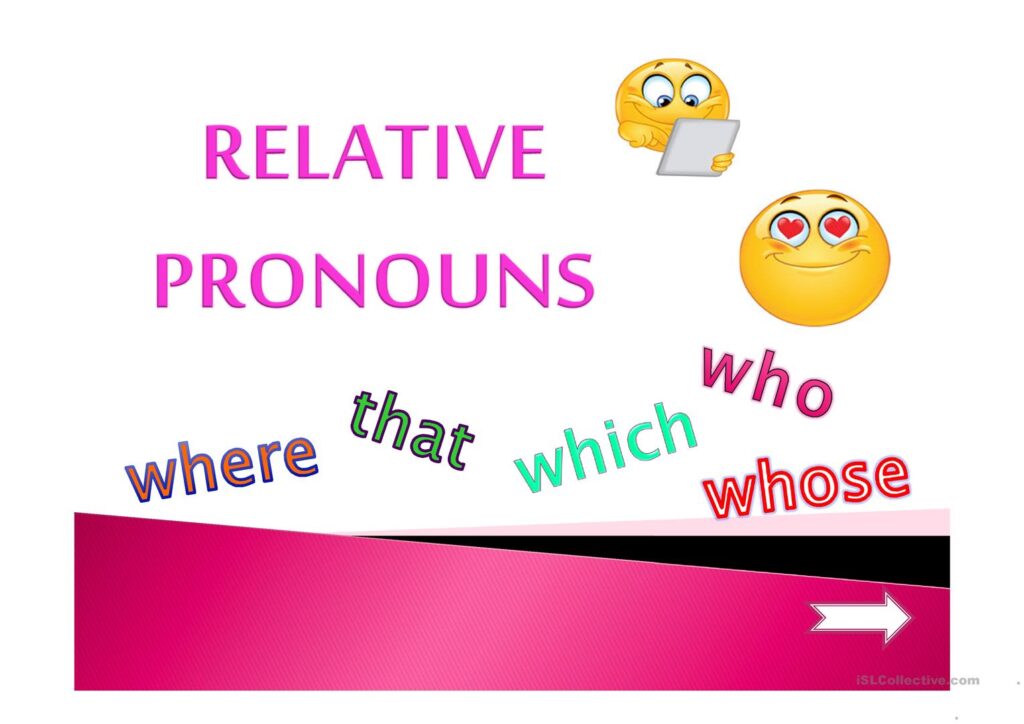DOWNLOAD MOBILE APPLICATION TO LEARN MORE: RELATIVE PRONOUNS IN ENGLISH GRAMMAR

DOWNLOAD MOBILE APPLICATION TO LEARN MORE: RELATIVE PRONOUNS IN ENGLISH GRAMMAR
DOWNLOAD MOBILE APPLICATION TO LEARN MORE: RELATIVE PRONOUNS IN ENGLISH GRAMMAR
A relative pronoun is a word that introduces a dependent (or relative) clause and connects it to an independent clause. A clause beginning with a relative pronoun is poised to answer questions such as Which one? How many? or What kind? Who, whom, what, which, and that are all relative pronouns.
Relative clauses are also sometimes referred to as adjective clauses, because they identify or give us additional information about the subject of the independent clause they relate to. Like adjectives, these clauses in some way describe that subject. Relative pronouns, like conjunctions, are words that join clauses—in this case, a relative clause to its main clause. The type of relative pronoun used depends on what kind of noun is being described.
DOWNLOAD MOBILE APPLICATION TO LEARN MORE: RELATIVE PRONOUNS IN ENGLISH GRAMMAR
Table of Contents
RELATIVE PRONOUNS IN ENGLISH GRAMMAR
1. The board of directors (1)/ want the facilities (2) / of car and accommodation (3)/ for itself. (4) / No Error (5)
2. Every teacher (1)/ and every student (2)/ of this school is determined to do their best (3)/ for the benefit of all. (4)/ No Error (5)
3. The officer (1)/ as well as the (2)/ clerks absented themselves (3)/ from the office. (4)/ No Error (5)
4. There were (1)/ five active workers (2)/ and three lazy one (3)/ in the factory. (4) / No Error (5)
5. There is none (1)/ who can (2)/support you (3) / in this crucial period. (4) / No Error (5)
6. Any of the (1)/ two photos which reflect (2)/ the natural beauty of Kashmir (3)/ is worth seeing. (4)/ No Error (5)
7. The guests (1)/ whom we were talking (2)/ about have arrived (3)/ are my relatives. (4)/ No Error (5)
8. He introduced (1)/ to the chairman as (2)/ the t President of the (3)/ workers association. (4)/
No Error (5)
9. As a student (1)/ of arts (2)/ you are much better (3)/ than him. (4)/ No Error (5)
10. He hates everybody (1)/ and everything who (2)/ reminds him (3)/ of his blunder. (4)/ No Error (5)
DOWNLOAD MOBILE APPLICATION TO LEARN MORE: RELATIVE PRONOUNS IN ENGLISH GRAMMAR
11. Whomever (1)/ does not come in time (2)/ will be allowed (3) / to mark his presence. (4)/ No Error (5)
12. The six partners (1)/ are at daggers drawn (2)/ so they do not talk (3) to each other. (4)/ No Error (5)
13. If someone has (1)/completed (2) the work (3)/ he may leave. (4)/ No Error (5)
14. She lent me (1)/ some money with the condition (2)/ that I should return (3)/ the same within a month. (4)/ No Error (5)
15. The teacher instructed (1)/ the peon to let (2)/ the students and I (3)/ go into the office of Principal. (4)/ No Error (5)
16. The candidate (1)/ being a commerce graduate (2)/ she is eligible (3)/ for the post of accountant. (4)/ No Error (5)
17. In all circumstances (1)/I have (2) helped him (3)/and he knows. (4)/ No Error (5)
18. I don’t appreciate (1)/ him who laugh (2)/ at others without (3)/ any reason. (4)/ No Error (5)
19. You and myself (1)/ will enjoy the function (2)/being arranged in honour of (3)/ the new Principal.(4)/ No Error (5)
20. He asked for (1)/ permission to go to the cinema (2)/ but his mother (3)/ did not give. (4)/ No Error (5)
DOWNLOAD MOBILE APPLICATION TO LEARN MORE: RELATIVE PRONOUNS IN ENGLISH GRAMMAR
ALSO VISIT: VERBAL ABILITY
DOWNLOAD MOBILE APPLICATION TO LEARN MORE: RELATIVE PRONOUNS IN ENGLISH GRAMMAR
ANSWERS:
| 1.4 2.3 3.3 4.3 5.2 6.1 7.2 8.1 9.4 10.2 | 11.1 12.4 13.5 14.4 15.3 16.3 17.4 18.2 19.1 20.4 |
DOWNLOAD MOBILE APPLICATION TO LEARN MORE: RELATIVE PRONOUNS IN ENGLISH GRAMMAR
DOWNLOAD MOBILE APPLICATION TO LEARN MORE: RELATIVE PRONOUNS IN ENGLISH GRAMMAR
